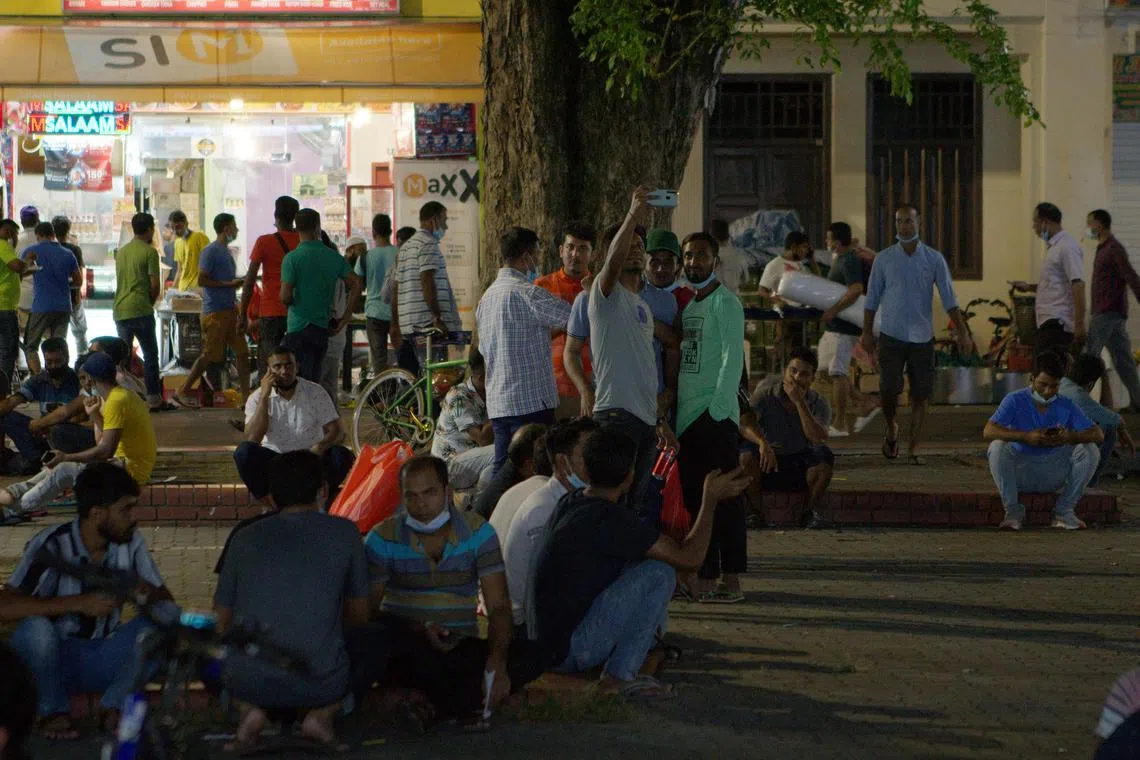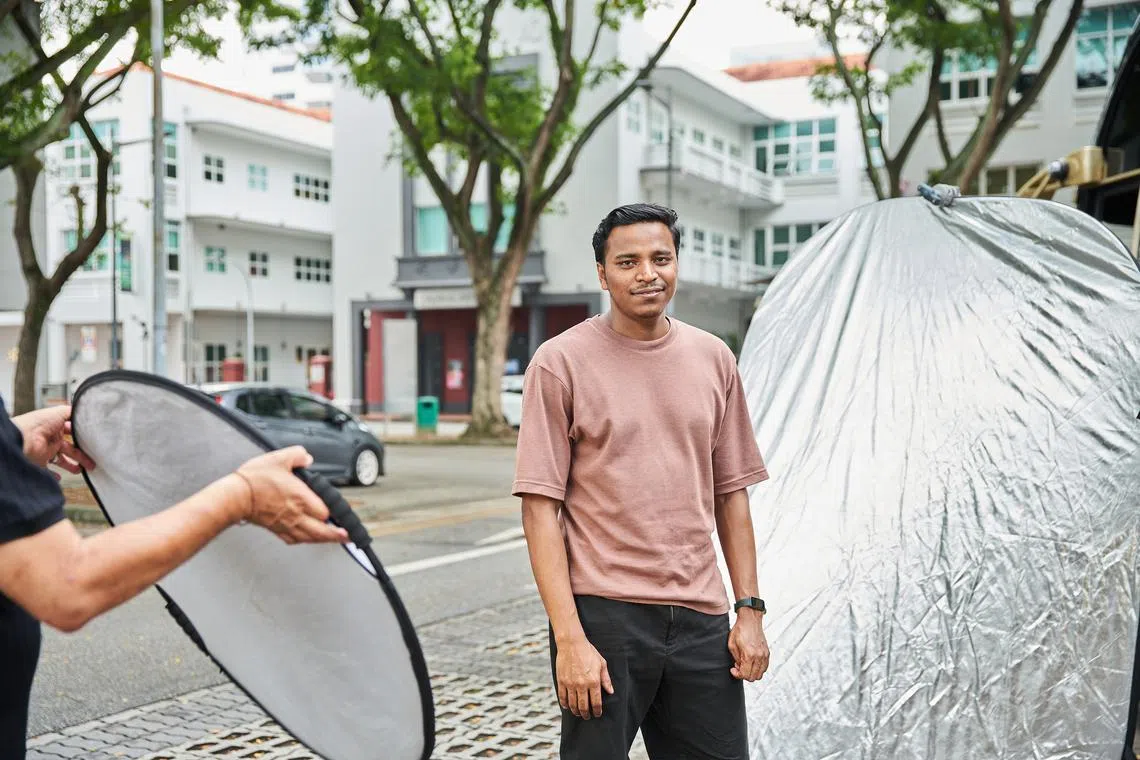Documentary puts Jalan Besar’s migrant workers at the centre of the frame
Sign up now: Get ST's newsletters delivered to your inbox

Singaporean film-maker Benny Loh's (right) short-form documentary, Liminal Space, explores Jalan Besar and highlights, among other things, the aspirations of migrant workers such as Mr A.K. Zilani (left).
PHOTO: RANDY ANG
SINGAPORE – Jalan Besar’s special draw as an urban enclave that has become a home away from home for Singapore’s foreign workers is the subject of a new short-form documentary that premieres online on July 26.
From volunteers at the Migrant Workers’ Centre, who reach out and gather feedback, to migrant workers who spend their day off on Sundays pursuing the arts, Singaporean film-maker Benny Loh’s Liminal Space puts Singapore’s South Asian migrant workers at the centre of the frame.
“Just turn the corner to another street and you’ll find a different community, urbanscape and vibe. This was what inspired me to make the film – the beauty of Jalan Besar, where every turn enthrals with the element of surprise.”
Loh is the founder of home-grown Studio Zeros, an architecture and interiors photography and video firm established in 2015.
The 10-minute visual narrative sheds light on why migrant workers from India and Bangladesh are drawn to the area. Loh shot at various locations in the Jalan Besar area, located within and near the Little India and Kampong Glam Historic Districts.
The area has a distinctive streetscape with mainly low-rise shophouses and a handful of modern developments. It is characterised by numerous heritage businesses, clan associations, eating houses, shops, places of worship and offices that contribute to its vibrancy.
Foreign workers who were employed mainly in the construction industry started congregating around Jalan Besar and Little India in the 1990s, when more workers from India and Bangladesh were brought in to work alongside others from Thailand and Malaysia on urban development projects across the island.
Eye-opening experience
Loh, 44, who is also an architecture and interiors photographer, has been steadily building up a catalogue of 27 self-funded micro-documentaries and videos for the last decade. These are available in a dedicated section of the Studio Zeros website called In.Visible Space and on Instagram (@in.visiblespace).
In.Visible Space is an online platform that documents Singapore’s urban development as well as captures people’s memories of city spaces.
A highlight of his portfolio is a 2022 short-form documentary titled Experiences, which takes a peek at tenants in Peninsula Shopping Centre in Coleman Street, one of Singapore’s ageing malls built in the 1970s.
The 10-minute documentary was also shown at Singapore Art Week 2022.
His more recent Jalan Besar project, which took more than seven months to shoot, was an “eye-opener” for the veteran film-maker, who found micro-spaces within the precinct that different groups gravitate towards.
“Jalan Besar is a vibrant mix of spaces. Over at Little India, mainly South Indian workers get together, while at Lembu Road Open Space, colloquially known as ‘Minimart’, the Bangladeshi migrant community socialises. There are also many eateries in the public housing estate along Veerasamy Road and Tekka Centre that are packed with different communities on Sundays.”
He notes that two of the most popular eateries for migrant workers are Tekka Centre in Buffalo Road for South Indian dishes, such as naan and chapati; and Dhaka Restaurant in Desker Road, for home-style Bangladeshi cuisine.

The 10-minute documentary was also shown at Singapore Art Week 2022.
PHOTO: STUDIO ZEROS
He is also particularly captivated by the street life in Lembu Road and Dunlop Street, which are closed to traffic on Sundays.
“The spaces are filled with transient workers gathering, eating and shopping, coupled with some tourists who visit to soak in the sights and sounds,” he says.
“It reminds me a lot of Chinatown during Chinese New Year. The only difference is that this is happening every week of the year.”
Inclusiveness and safety
One of the migrant workers featured in Liminal Space is Mr Annadurai Periyasamy, who works as a lorry driver at Singapore firm Aritz Design and Construction.
The 39-year-old came to Singapore in 2012 from Tamil Nadu, South India, to take up a position as lorry driver in a construction firm.
He changed jobs over the years and, since 2015, has been working as a driver with Aritz.
“I love the Jalan Besar area, especially Serangoon Road, which has Hindu temples that I frequent as often as I can, as well as eateries that serve good quality dishes from all parts of India,” says Mr Periyasamy, speaking in a combination of English and Tamil.
“There is also a high level of safety and orderliness in Singapore that we as migrant workers can’t find in other cities,” he adds.
“This is very important for me and my friends. We can socialise around Mustafa Centre in Syed Alwi Road, eat in Race Course Road or shop for gold along Serangoon Road in safety.”
He says the best part about working in Singapore is the kindness shown by his bosses, who put in a lot of effort to make sure that the migrant workers are happy in their jobs.
Mr Alan Tan, managing director of Aritz, says it is important to chart the career development of migrant workers in his firm, alongside planning for his local staff. The company has 26 employees, of whom 19 are migrant workers. Aritz was founded in 2014 and specialises in building repair, interior design, renovation and carpentry works.
Loh approached Mr Tan in January to feature Mr Periyasamy in the film and was given the green light.
“Supporting the aspirations of all my staff helps our transient workforce to adapt to a new culture and environment, leading to better communication and collaboration with colleagues,” he says.
“Our migrant workers often bring diverse perspectives and experiences to the workplace which can enhance creativity, innovation and problem-solving within the company,” adds Mr Tan, 48.
“This helps to promote a positive work environment, enhances diversity and contributes to long-term business growth.”
Big city, big dreams
The documentary also zooms in on the aspirations of young migrant worker A.K. Zilani, who has a passion for theatre. He is currently a member of theatre group The Birds Migrant Theatre.
The 32-year-old says he felt pangs of nostalgia while talking about his early life in Singapore in preliminary interviews for the film in March.
He came to Singapore in January 2011 from Cumilla, in eastern Bangladesh, as a general worker in the construction industry.
He is now working as an electrician in a local trading firm and says his bosses are supportive of his work in theatre.
“Throughout the interview and filming, I experienced happiness reflecting on my accomplishments and hope for a better future,” he says, highlighting that he is happy and proud to be able to pursue his passion for the arts and culture in Singapore.
“I shared my personal journey from the beginning of my life in Singapore to the present, illustrating how the country has shaped me from a young boy into an adult.”

The 32-year-old says he felt pangs of nostalgia while talking about his early life in Singapore in preliminary interviews for the film in March.
PHOTO: RANDY ANG
He says that in the beginning, he did not expect to be able to pursue other interests besides his professional work.
“But with the support of and guidance from a few wonderful individuals at my workplace and in theatre, I was able to train and develop my skills. This has allowed me to become more than just a migrant worker, which is a dream for many,” he adds.
Resident playwright of The Necessary Stage, Haresh Sharma, has worked with Zilani on several arts projects before as part of The Birds Migrant Theatre, of which Sharma is a mentor.
Zilani also took part in a playwriting workshop conducted by Sharma in 2020 and 2021.
The Birds Migrant Theatre, a theatre group formed by migrant workers from Indonesia, Bangladesh and the Philippines in 2018, approached Sharma to be a mentor as they needed guidance.
Since then, it has organised several theatre workshops and staged public readings and performances.
Power of theatre
Sharma says The Necessary Stage has supported the migrant theatre group through the years by providing free space for workshops and rehearsals.
The Necessary Stage is now at Yi Guang Building in Paya Lebar Road.
“Zilani is very unassuming, kind and patient,” says Sharma. “He’s also a true artist.”
He co-directed Foreign Bodies with Serena Ho, which starred Zilani in the lead role as Arif, a migrant worker who grapples with his girlfriend’s unplanned pregnancy.
It was performed at the Esplanade in January 2023 as part of the M1 Singapore Fringe Festival. The play was rehearsed on Sundays, Zilani’s only day off.
“His interest in theatre goes deep into a genuine care for society and humanity. Whether as a playwright or performer, he believes in the power of theatre to engage and transform,” says Sharma.
“It’s unusual because most shows rehearse daily, especially leading up to the performance. However, the migrant artists, such as Zilani, are able to rise above this challenge. During the week, they work on their scenes in their free time. So, when they come on Sunday, they are prepared and ready to rehearse,” adds Sharma.
For the Foreign Bodies show, Sharma recalls that the full dress rehearsal was in the morning of the performance, and there were three shows during the rest of the day.
He says he is working with The Birds Migrant Theatre on a new play for 2025, which is about refugee issues and displacement.
The play, which is written by four migrant workers from the theatre group, came about after discussions with the writers on their concerns and what issues they are keen to write about.
They then started writing scenes which Sharma is helping to develop into a full play.
“Singaporeans have to change our perceptions that migrant workers know nothing beyond their job. On the contrary, they are people with varied interests and concerns,” Sharma adds.
“Some are poets, some are artists, some aspire to start businesses, to learn, to teach; some enjoy discussing current affairs; and many are attached to Singapore and hold special memories of what this country means to them.”
To see Benny Loh’s showcase of documentaries, including Liminal Space, go to str.sg/qTAS



